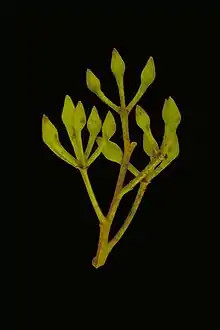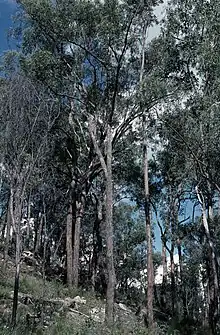Eucalyptus rubiginosa
Eucalyptus rubiginosa is a species of tree that is endemic to Queensland. It has rough, fibrous bark, lance-shaped or curved adult leaves that are paler on the lower surface, flower buds in groups of nine or eleven, white flowers and cup-shaped or hemispherical fruit.
| Eucalyptus rubiginosa | |
|---|---|
 | |
| Flower buds of Eucalyptus rubiginosa | |
 | |
| Full tree | |
| Scientific classification | |
| Kingdom: | Plantae |
| Clade: | Tracheophytes |
| Clade: | Angiosperms |
| Clade: | Eudicots |
| Clade: | Rosids |
| Order: | Myrtales |
| Family: | Myrtaceae |
| Genus: | Eucalyptus |
| Species: | E. rubiginosa |
| Binomial name | |
| Eucalyptus rubiginosa | |
Description
Eucalyptus rubiginosa is a tree that typically grows to a height of 15–20 m (49–66 ft) and forms a lignotuber. It has thick, rough, fibrous, reddish brown bark on the trunk and branches more than about 20 mm (0.79 in) thick. Young plants and coppice regrowth have narrow lance-shaped leaves that are dull green, paler on the lower surface, 100–150 mm (3.9–5.9 in) long and 15–30 mm (0.59–1.18 in) wide. Adult leaves are arranged alternately, dark green on the upper surface, paler below, lance-shaped or curved, 70–150 mm (2.8–5.9 in) long and 10–30 mm (0.39–1.18 in) wide tapering to a petiole 8–20 mm (0.31–0.79 in) long. The flower buds are arranged on the ends of branchlets in groups of nine or eleven on a branched peduncle 5–26 mm (0.20–1.02 in) long, the individual buds on pedicels 5–10 mm (0.20–0.39 in) long. Mature buds are oval, 8–11 mm (0.31–0.43 in) long and 4–7 mm (0.16–0.28 in) wide with a conical operculum. Flowering occurs between September and November and the flowers are white. The fruit is a woody cup-shaped or hemispherical capsule 6–9 mm (0.24–0.35 in) long and 9–12 mm (0.35–0.47 in) wide with the valves near rim level.[2][3][4]
Taxonomy and naming
Eucalyptus rubiginosa was first formally described in 1984 by Ian Brooker in the journal Australian Forest Research.[5] The specific epithet (rubiginosa) is from the Latin word rubiginosus meaning "rusty red", referring to the colour of the bark of this tree.[2][6]
Distribution and habitat
This tree grows over sandstone in forest and woodland mainly between Bauhinia Downs and Theodore especially in the Isla Gorge National Park but also in the Barakula State Forest near Chinchilla.[2][3]
Conservation status
This eucalyptus is classified as "least concern" under the Queensland Government Nature Conservation Act 1992.[7]
See also
References
- "Eucalyptus rubiginosa". Australian Plant Census. Retrieved 16 December 2019.
- "Eucalyptus rubiginosa". Euclid: Centre for Australian National Biodiversity Research. Retrieved 29 May 2020.
- Chippendale, George M. "Eucalyptus rubiginosa". Australian Biological Resources Study, Department of the Environment and Energy, Canberra. Retrieved 16 December 2019.
- Brooker, M. Ian H. (1984). "Eucalyptus rubiginosa, a new species of undetermined affinities from Queensland". Australian Forest Research. 14: 311–317. Retrieved 16 December 2019.
- "Eucalyptus rubida". APNI. Retrieved 16 December 2019.
- William T. Stearn (1992). Botanical Latin. History, grammar, syntax, terminology and vocabulary (4th ed.). Portland, Oregon: Timber Press. p. 485.
- "Eucalyptus rubiginosa". WetlandInfo. Queensland Government. Retrieved 13 November 2016.